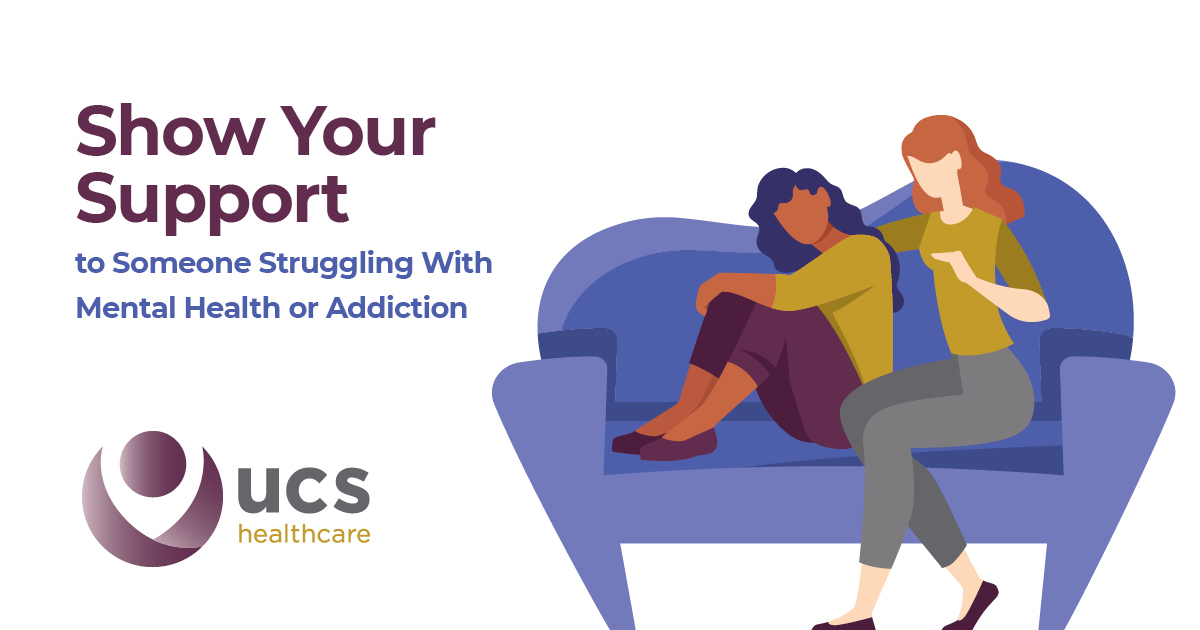A Call for Compassion: How To Support Someone With Mental Illness or Substance Use Disorder
February 5, 2021

By David Depew, tLMHC, CRC, CADC; UCS Healthcare Mental Health Therapist
I worked for over ten years with a co-worker who was the mother of three children. When her children were all still in grade school, she developed breast cancer. Treatment included months of chemotherapy which took its toll on her ability to parent. Friends, family, and co-workers gathered around to make meals, clean the house, take the kids to school and babysit. No one ever said, “How dare she put cancer before her kids.”
Why Don’t We Show Compassion For Persons With Substance Use Disorders or Support Those Struggling with Mental Illness?
Why is it we have compassion for some illnesses and not others? Can you imagine someone blaming a person for cancer, Multiple Sclerosis, or Parkinson’s disease?
But we do blame people for some mental health issues like depression, saying they need to “think positive” or “just quit worrying so much.” Helping someone with mental health issues means we must stop placing blame and instead focus on learning, understanding and being supportive.
We also blame people for substance use disorders - claiming it is a choice or that they just need to “say no.” Substance Use Disorder is a disease and we need to have compassion for these individuals as they work on recovery.
Where’s the compassion that was shown to my friend with breast cancer? Why aren’t we supporting and helping those struggling with substance use disorder and mental illness?
How to Let Go of Confusion & Hurt To Support Someone with Mental Illness or Substance Use Disorder
An answer might be found by reflecting on our own experiences and understanding of addiction and mental health. There are many reasons it can be difficult to help someone with mental health issues or substance use disorder.
Educate Yourself About Mental Illness & Addiction
Sometimes it is hard to show compassion for diseases we don’t understand. Commit to educating yourself on the impacts of mental health and substance use disorders. A more thorough knowledge of these diseases can open you up to compassion, support and understanding.
Accept That Mental Health Issues or Substance Use Disorders Can Impact Anyone - Even You
Sometimes we find it easier to blame someone for their mental illness or substance use disorder than to face the reality that we might also be at risk for that disease, through no fault of our own. We might believe that someone struggling with alcohol or drugs “did something wrong and I didn’t, so I’m safe.”
The truth is, substance use disorders and mental illness can impact anyone at any point in life. We are all susceptible and our physical health, life experiences, stressors and much more can impact our mental health and substance use habits.
Process Experiences Which Have Cast Mental Health & Substance Use in a Negative Light
Sometimes it’s hard to show compassion when we’ve been hurt by that disease. Maybe a parent or loved one lived with mental illness or drug and alcohol use disorders and we suffered because of it.
If you were hurt by mental illness or substance use, it’s important to talk with someone about those feelings and process through those experiences. We are here to help if you want to talk.
Finding Compassion For Ourselves and Others
As humans we want to believe the world is fair, just, and safe. It’s really hard on us when it’s not. The pandemic has been especially difficult on us. If our first reaction is to judge, perhaps we can take a moment to educate ourselves first and find ways of supporting people with a mental illness or substance use disorder. Now more than ever, it is time to dig into ourselves and find compassion for others and for ourselves.
UCS Healthcare is Here to Help
Whether you are struggling with the stressors of the pandemic, mental illness or substance use disorder, UCS Healthcare is here to support you. Schedule an appointment today.
Learn more about how alcohol consumption has changed during the pandemic in our COVID article series: